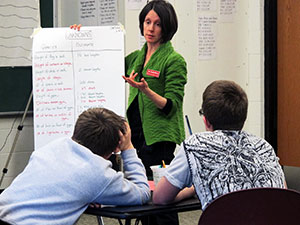Overview and Project Timeline
Today’s middle school mathematics classrooms are marked by (A) increasing cognitive diversity and (B) students’ persistent cognitive difficulties in learning algebra. Traditional responses to Problem A are tracked classes that contribute to opportunity gaps, i.e., inequitable access to high-quality mathematics instruction, and result in achievement gaps. Considerable attention to Problem B has led to the successful integration of algebraic reasoning into students’ developing whole number knowledge in elementary schools. Very little attention has been paid to how students’ rational number knowledge and algebraic reasoning can be mutually supported in middle school, even though rational number knowledge is seen as critical for success in algebra.
The IDReAM Project investigates (1) how to effectively differentiate instruction for middle school students at different reasoning levels; and (2) how to foster middle school students’ algebraic reasoning and rational number knowledge in mutually supportive ways. Differentiating instruction in heterogeneous classrooms is a novel but untested response to Problem A; developing learning trajectories that connect two key domains and address different reasoning levels will be a basis for differentiated instruction and respond to Problem B. Three interdependent project phases will lead to three products: learning trajectories for cognitively diverse middle school students that conjoin rational number knowledge and algebraic reasoning, materials for differentiating mathematics instruction developed collaboratively with teachers, and a written assessment to evaluate students’ levels of multiplicative reasoning.

In Phase I (Years 1-2, fall 2013-spring 2015) Amy, as a teacher-researcher, taught cognitively diverse groups of 6-9 middle school students in a series of three design experiments after school. We also began two major strands of analysis (see Analysis in Progress).
In Phase II (Year 3, 2015-2016 academic year) research team members formed a study group with 15 middle school mathematics teachers to explore differentiating instruction in their classrooms. These teachers came from across the state of Indiana—from Evansville, Bloomington, Ellettsville, Indianapolis, and Hammond. We kicked off the group with a 3-day workshop in July 2015, held monthly meetings during the academic year, and completed the year with a 1-day workshop in June 2016 (see Teacher Study Group).
In Phase III (Years 4-6, fall 2016-summer 2019) Amy and research team members are co-conducting classroom design experiments with up to 4 study group teachers and their students. We have completed two of these experiments so far. Research team members are studying how to implement differentiation in whole classrooms, as well as how teachers learn to differentiate instruction. We have begun a third major strand of analysis and are also developing materials for prospective and practicing teachers (see Analysis in Progress).

